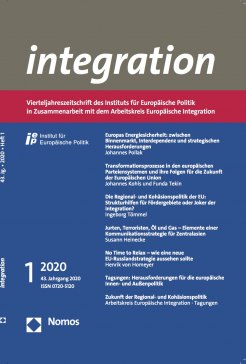Issue 1/2020 of integration published

Right after the launch of the political year 2020, the corona pandemic stroke and thwarted the many ambitious plans that the member states and especially the new European Commission had made for the year. The European Union (EU) is now, more than ever, operating in crisis mode and mobilising all available forces to limit human suffering and to contain the economic crisis. Nonetheless, it is also worthwhile looking at other significant challenges the continent is facing. As usual, the current issue 1/2020 of the academic quarterly integration contains in-depth analyses and interesting perspectives on European policy and integration research.
Johannes Pollak’s contribution is dealing with the topic of energy security and explains the area of tension between market liberalisation, security concerns and climate policy in which European energy policy operates. In their article, Johannes Kohls and Funda Tekin analyse what can be learned from the European elections regarding European party systems, which transformation processes are underway and what that means for European integration. Ingeborg Tömmel examines the goals, modes of governance and effects of the EU’s regional and cohesion policy, with the conclusion that the support does not always reach the desired targets, mainly due to excessive complexity. Michèle Knodt reports from the annual colloquium of the AEI 2019 on the same topic. In his forum article, Henrik von Homeyer states that the EU needs a new strategy on Russia and explains why a deep understanding of Russian interests and realistic objectives are crucial. Susann Heinecke also looks to the East, recommending a new, holistic communication strategy for EU-Central Asia relations and formulating concrete recommendations for it. Antonia Labitzky and Manuel Müller summarise the contents and the takeaways of the 11th German-Nordic-Baltic Forum in Tallinn, which looked back on the eventful year 2019 in terms of European policy.
You can find further information here.